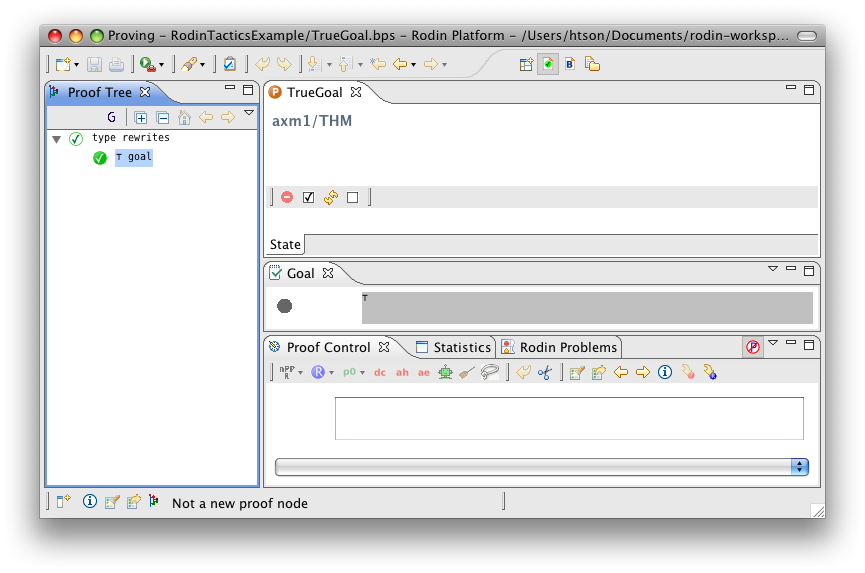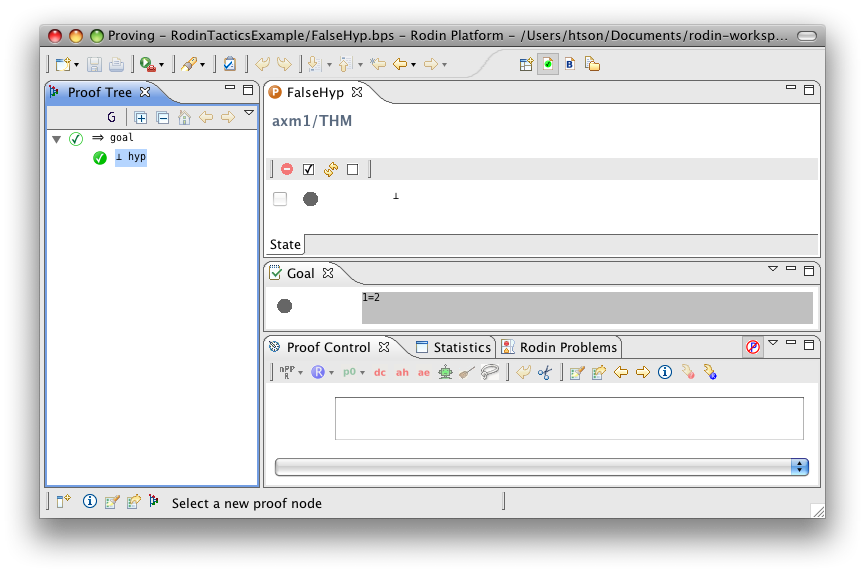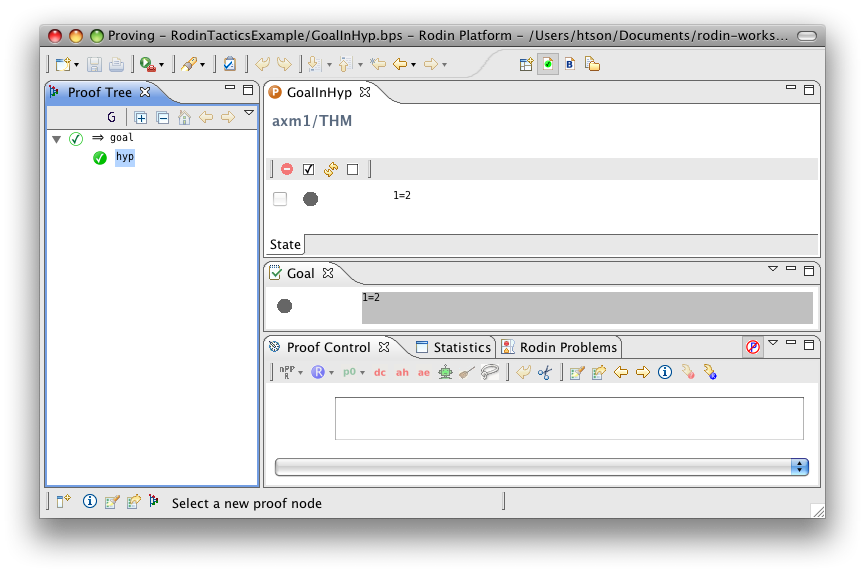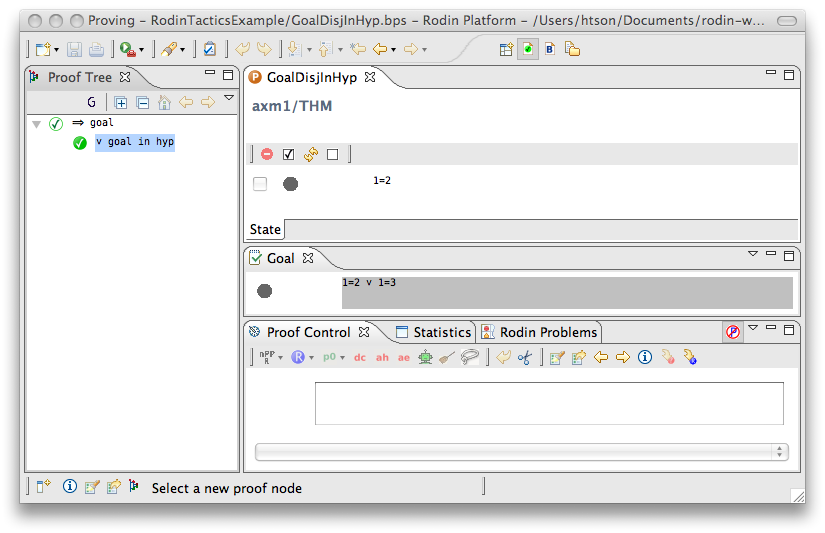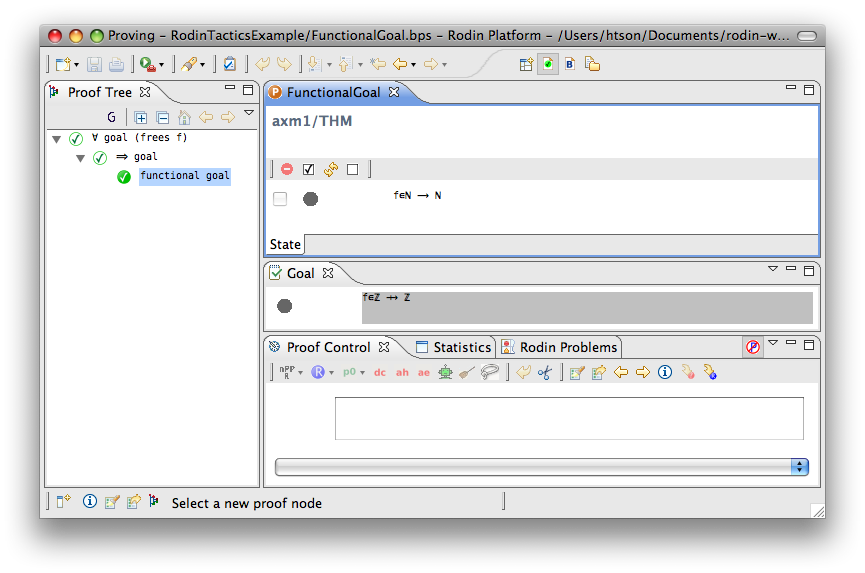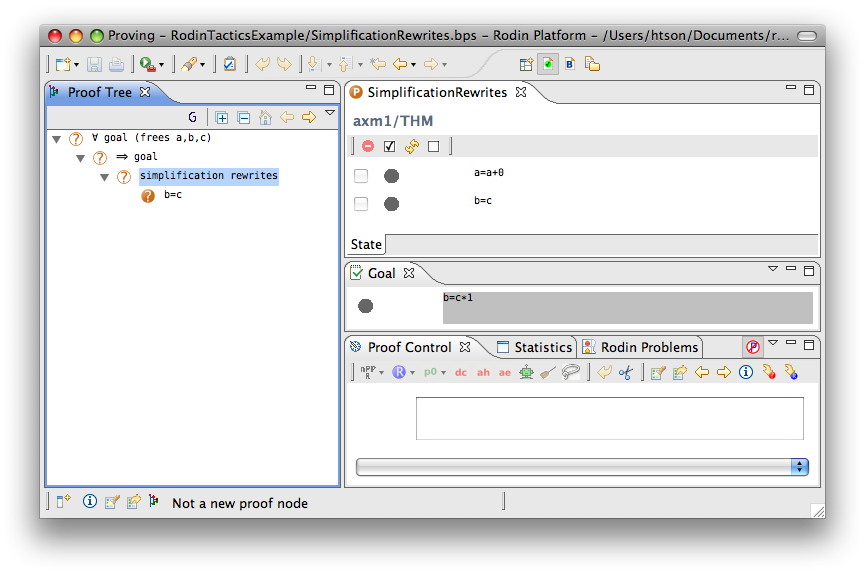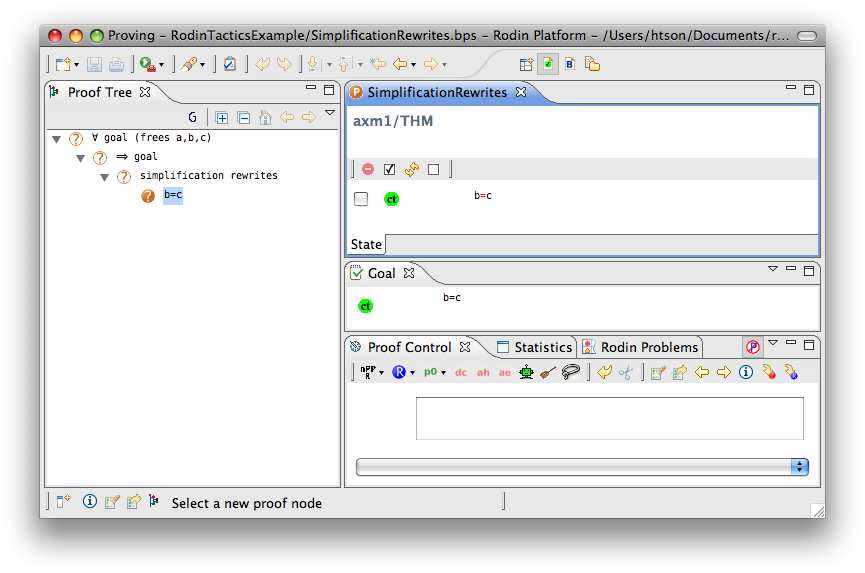Rodin Proof Tactics: Difference between revisions
From Event-B
Jump to navigationJump to search
imported>Son |
imported>Son |
||
| Line 140: | Line 140: | ||
== Type Rewriter == | == Type Rewriter == | ||
* '''Description''': | * '''Description''': Simplifies predicates containing type expressions such as E ∈ T to ⊤ and T = ∅ to ⊥. | ||
* ''' | * '''Additional details''': More information about type expressions in Event-B. | ||
* ''' | * '''ID''': org.eventb.core.seqprover.typeRewriteTac | ||
* '''Auto-tactic''': | * '''Auto-tactic''': ''Default'' | ||
* '''Post-tactic''': | * '''Post-tactic''': ''Default'' | ||
* ''' | * '''Preference display''': Type Rewriter (Simplify) | ||
* ''' | * '''Interactive''': ''No'' | ||
* '''Proving interface display''': | |||
== Implication Goal == | == Implication Goal == | ||
Revision as of 11:28, 9 March 2010
This page contains descriptions of the available proof tactics within the RODIN Platform.
For each tactic, the descriptions is as follows:
- Description: A high-level description of the tactic. This will be the description appeared in the RODIN Platform preferences.
- Additional details: (Optional) Details explanation of the tactic.
- ID: An unique ID associated with the tactic.
- Auto-tactic: No: the tactic cannot be added as an auto-tactic. Yes: the tactic can be added as an auto-tactic. Default: the tactic is a default auto-tactic.
- Post-tactic: No: the tactic cannot be added as a post-tactic. Yes: the tactic can be added as a post-tactic. Default: the tactic is a default post-tactic.
- Preference display: Information on how an application of the tactic is displayed in the auto-tactic preference or the post-tactic preference.
- Interactive: No: the tactic cannot be invoked interactively. Global: The tactic can be invoked from the Proof Control. Goal: The tactic can be invoked from the goal view. Hypothesis: The tactic can be invoked from the hypothesis view. If the tactic can be invoked interactively (i.e. either Global, Goal or Hypothesis), more information about how this could be done will be given. Note that since the Post-tactics can be launched manually, any tactics that can be included in the post-tactic in principle can be invoked interactively via the post-tactic. Here No only means that there is no separate invocation for this specific tactic.
- Proving interface display: Example(s) on how an application of this tactic can be seen from the proving interface of the RODIN Platform.
True Goal
- Description: Discharges any sequent whose goal is '⊤' (logical true).
- ID: org.eventb.core.seqprover.trueGoalTac
- Auto-tactic: Default
- Post-tactic: Default
- Preference display: True Goal (Discharge)
- Interactive: No
- Proving interface display: ⊤ goal
False Hypothesis
- Description: Discharges any sequent containing a '⊥' hypothesis
- ID: org.eventb.core.seqprover.falseHypTac
- Auto-tactic: Default
- Post-tactic: Default
- Preference display: False Hypothesis (Discharge)
- Interactive: No
- Proving interface display: ⊥ hyp
Goal in Hypotheses
- Description: Discharges any sequent whose goal is contained in its hypotheses
- ID: org.eventb.core.seqprover.goalInHypTac
- Auto-tactic: Default
- Post-tactic: Default
- Preference display: Goal in Hypotheses (Discharge)
- Interactive: No
- Proving interface display: hyp
Goal Disjunct in Hypothesis
- Description: Discharges any sequent whose goal is a disjunction and one of whose disjuncts is present in the hypotheses.
- ID: org.eventb.core.seqprover.goalDisjInHypTac
- Auto-tactic: No
- Post-tactic: Default
- Preference display: Goal Disjunct in Hypotheses (Discharge)
- Interactive: No
- Proving interface display: ∨ goal in hyp
Functional Goal
- Description: Tries to discharge a sequent whose goal states that an expression is a function (i.e. f ∈ T1 ⇸ T2, where T1 and T2 are type expressions).
- Additional details: The sequent is discharged if there is a hypothesis specifying that f is a function of any kind (i.e. partial function, total function, partial injection, total injection, partial surjection, total surjection, bijection).
- ID: org.eventb.core.seqprover.funGoalTac
- Auto-tactic: Default
- Post-tactic: Default
- Preference display: Functional Goal (Discharge)
- Interactive: No
- Proving interface display: functional goal
Simplification Rewriter
- Description: Tries to simplify all predicates in a sequent using pre-defined simplification rewriting rules.
- Additional details: The list of rewriting rules are in the following page http://wiki.event-b.org/index.php/All_Rewrite_Rules, which are marked as Automatic.
- ID: org.eventb.core.seqprover.autoRewriteTac
- Auto-tactic: Default
- Post-tactic: Default
- Preference display: Simplification Rewriter (Simplify)
- Interactive: No
- Proving interface display: simplification rewrites
The example below shows the screen-shot of the step before the application of the tactic and the step just after the application of the tactic. There are 3 rewritings have been done as follows.

Note that  hypothesis is always dropped in the RODIN Platform.
hypothesis is always dropped in the RODIN Platform.
Type Rewriter
- Description: Simplifies predicates containing type expressions such as E ∈ T to ⊤ and T = ∅ to ⊥.
- Additional details: More information about type expressions in Event-B.
- ID: org.eventb.core.seqprover.typeRewriteTac
- Auto-tactic: Default
- Post-tactic: Default
- Preference display: Type Rewriter (Simplify)
- Interactive: No
- Proving interface display:
Implication Goal
- Description: TODO
- ID: TODO
- Display: TODO
- Auto-tactic: TODO
- Post-tactic: TODO
- Interactive: TODO
- Example: TODO
For-all Goal
- Description: TODO
- ID: TODO
- Display: TODO
- Auto-tactic: TODO
- Post-tactic: TODO
- Interactive: TODO
- Example: TODO
Exists Hypothesis
- Description: TODO
- ID: TODO
- Display: TODO
- Auto-tactic: TODO
- Post-tactic: TODO
- Interactive: TODO
- Example: TODO
Find Contradictory Hypothesis
- Description: TODO
- ID: TODO
- Display: TODO
- Auto-tactic: TODO
- Post-tactic: TODO
- Interactive: TODO
- Example: TODO
Use Equality Hypothesis
- Description: TODO
- ID: TODO
- Display: TODO
- Auto-tactic: TODO
- Post-tactic: TODO
- Interactive: TODO
- Example: TODO
Shrink Implicative Hypothesis
- Description: TODO
- ID: TODO
- Display: TODO
- Auto-tactic: TODO
- Post-tactic: TODO
- Interactive: TODO
- Example: TODO
Shrink Enumerated Set
- Description: TODO
- ID: TODO
- Display: TODO
- Auto-tactic: TODO
- Post-tactic: TODO
- Interactive: TODO
- Example: TODO
Implicative Hypothesis with Conjunctive RHS
- Description: TODO
- ID: TODO
- Display: TODO
- Auto-tactic: TODO
- Post-tactic: TODO
- Interactive: TODO
- Example: TODO
Implicative Hypothesis with Disjunctive LHS
- Description: TODO
- ID: TODO
- Display: TODO
- Auto-tactic: TODO
- Post-tactic: TODO
- Interactive: TODO
- Example: TODO
Conjunctive Goal
- Description: TODO
- ID: TODO
- Display: TODO
- Auto-tactic: TODO
- Post-tactic: TODO
- Interactive: TODO
- Example: TODO
Clarify Goal
- Description: TODO
- ID: TODO
- Display: TODO
- Auto-tactic: TODO
- Post-tactic: TODO
- Interactive: TODO
- Example: TODO
Functional Overriding in Goal
- Description: TODO
- ID: TODO
- Display: TODO
- Auto-tactic: TODO
- Post-tactic: TODO
- Interactive: TODO
- Example: TODO
Functional Overriding in Hypothesis
- Description: TODO
- ID: TODO
- Display: TODO
- Auto-tactic: TODO
- Post-tactic: TODO
- Interactive: TODO
- Example: TODO
Partition Rewriter
- Description: TODO
- ID: TODO
- Display: TODO
- Auto-tactic: TODO
- Post-tactic: TODO
- Interactive: TODO
- Example: TODO
One-Point Rule in Goal
- Description: TODO
- ID: TODO
- Display: TODO
- Auto-tactic: TODO
- Post-tactic: TODO
- Interactive: TODO
- Example: TODO
One-Point Rule in Hypothesis
- Description: TODO
- ID: TODO
- Display: TODO
- Auto-tactic: TODO
- Post-tactic: TODO
- Interactive: TODO
- Example: TODO
Bounded Goal with Finite Hypothesis
- Description: TODO
- ID: TODO
- Display: TODO
- Auto-tactic: TODO
- Post-tactic: TODO
- Interactive: TODO
- Example: TODO
